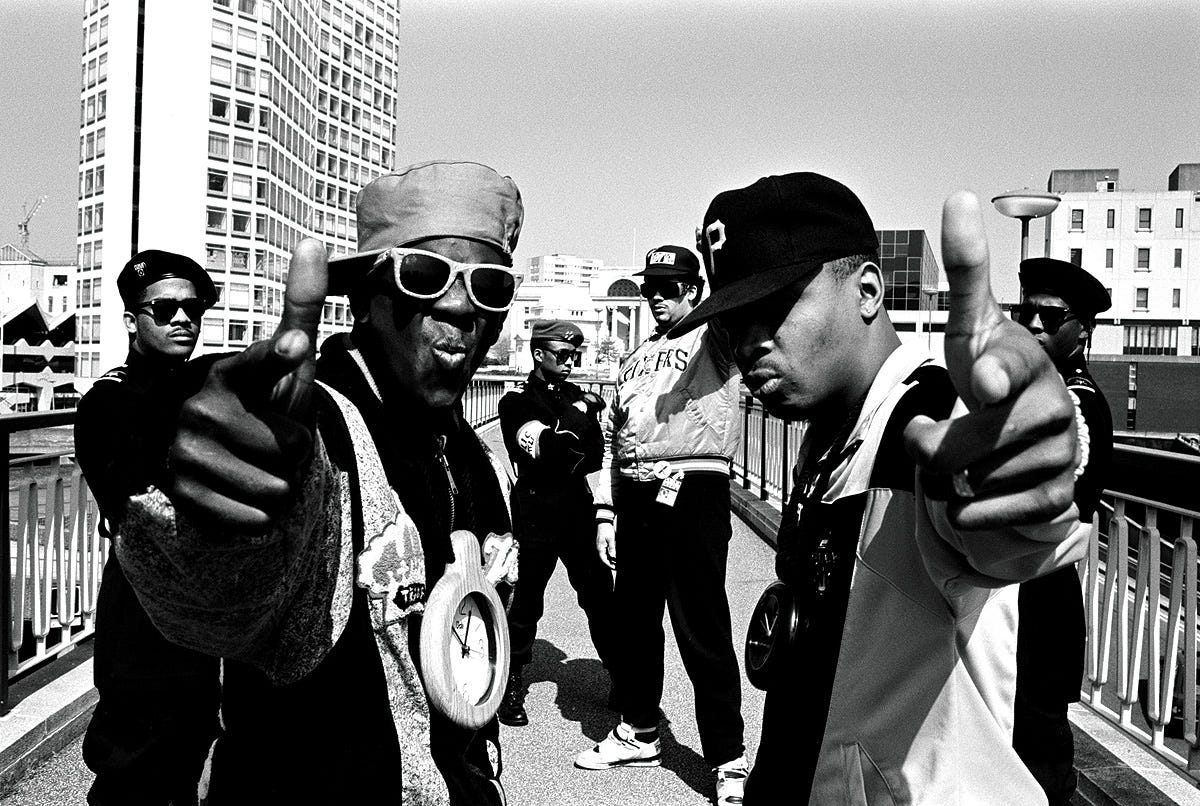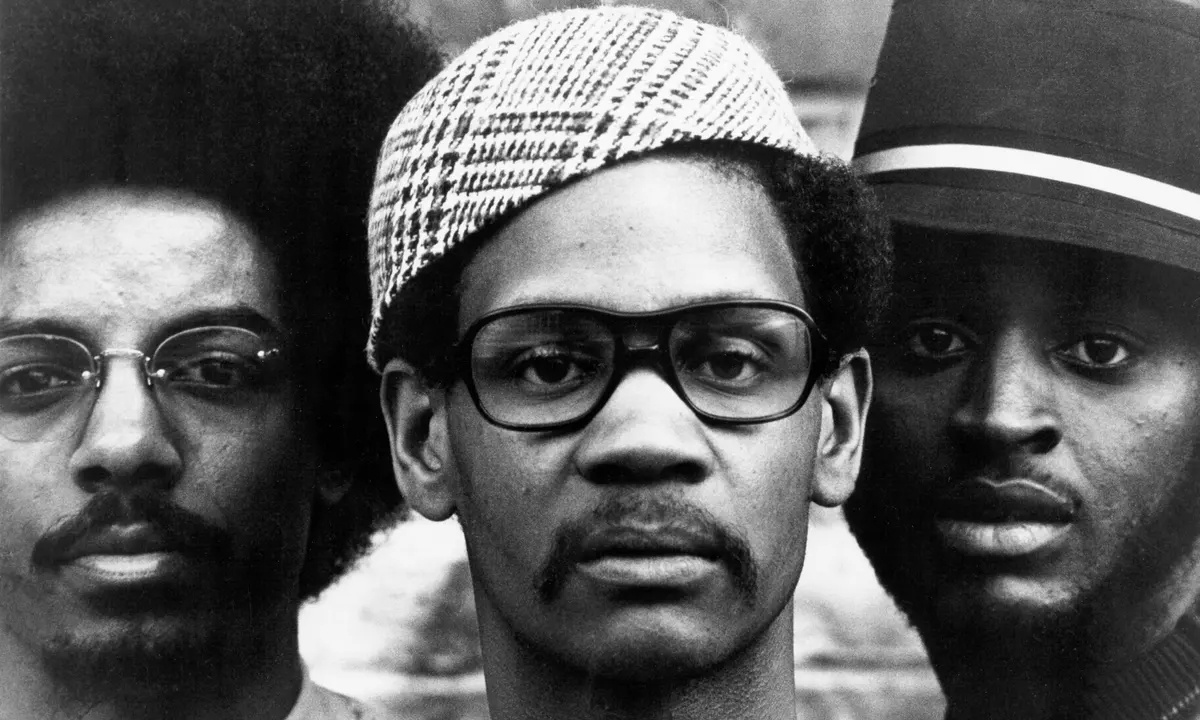

Hip Hop
What Is Abstract Hip Hop
Modified: January 22, 2024
Discover the unique and experimental sounds of abstract hip hop, a genre that pushes the boundaries of traditional hip hop music. Experience the fusion of innovative beats and thought-provoking lyrics in this captivating musical style.
(Many of the links in this article redirect to a specific reviewed product. Your purchase of these products through affiliate links helps to generate commission for AudioLover.com, at no extra cost. Learn more)
Table of Contents
Introduction
Hip Hop is a genre of music that originated in African American and Afro-Caribbean communities in the 1970s. Over the years, Hip Hop has evolved and diversified into various subgenres, each with its own unique characteristics and styles. One such subgenre is Abstract Hip Hop, which emerged in the late 1980s and early 1990s. Abstract Hip Hop pushed the boundaries of traditional Hip Hop by experimenting with unconventional sounds, production techniques, and lyrical themes.
Abstract Hip Hop can be defined as a subgenre that focuses on the exploration of non-traditional musical elements, often delving into avant-garde and experimental soundscapes. It challenges the conventional song structures and brings a sense of unpredictability to the music. Abstract Hip Hop artists break away from the mainstream norms and strive to create innovative and thought-provoking compositions.
Throughout this article, we will explore the origins, characteristics, artists, and impact of Abstract Hip Hop. We will delve into the intricacies of its sound and production techniques, its role in pushing the boundaries of traditional Hip Hop, and the criticisms and controversies surrounding the genre. Join us on this journey as we unveil the fascinating world of Abstract Hip Hop.
Definition of Abstract Hip Hop
Abstract Hip Hop is a subgenre of Hip Hop that is known for its unconventional and experimental approach to music. It is characterized by its emphasis on non-traditional musical elements, unique soundscapes, and avant-garde production techniques. Abstract Hip Hop artists break away from traditional song structures and strive to create compositions that challenge the listener’s expectations.
Unlike mainstream Hip Hop, which often focuses on catchy hooks and straightforward lyrics, Abstract Hip Hop delves into abstract and complex themes. It explores a wide range of topics, including introspection, existentialism, social commentary, and personal reflection. The lyrics in Abstract Hip Hop often contain layers of symbolism, metaphor, and wordplay, inviting listeners to interpret and analyze the meaning behind the words.
In terms of sound, Abstract Hip Hop embraces experimentation and pushes the boundaries of what is considered “normal” in Hip Hop. It incorporates unconventional and obscure samples, often from genres outside of Hip Hop, including jazz, funk, electronic, and even classical music. These samples are manipulated and recontextualized to create unique sonic landscapes that defy traditional genre categorization.
One key characteristic of Abstract Hip Hop is its focus on the production aspect of the music. Abstract Hip Hop producers employ innovative techniques such as glitch, tape manipulation, and sound collage to create intricate and immersive sonic textures. They often prioritize the creation of atmospheres and moods, aiming to transport the listener into a sonic journey that is rich in depth and emotion.
It is important to note that Abstract Hip Hop is not widely commercialized or mainstream. It is often more appreciated and recognized within niche music communities and circles. It serves as a platform for artists to push creative boundaries and experiment with new sonic territories, challenging the prevailing norms in Hip Hop.
Overall, Abstract Hip Hop can be seen as a genre that embodies artistic freedom, expression, and exploration. It celebrates the unconventional and offers a refreshing alternative to the mainstream Hip Hop landscape. It invites listeners to embrace the unknown, dive into abstract realms, and experience Hip Hop in a whole new dimension.
Origins and Influences
The origins of Abstract Hip Hop can be traced back to the late 1980s and early 1990s, a time when Hip Hop was undergoing a period of artistic experimentation and innovation. Artists and producers began challenging the traditional boundaries of the genre, searching for new ways to express themselves and push their creative limits.
One of the key influences on the emergence of Abstract Hip Hop was the rise of underground and alternative Hip Hop scenes. These scenes rejected the commercialization and mainstream appeal of popular Hip Hop and instead focused on exploring new sounds and artistic directions. Groups like De La Soul, A Tribe Called Quest, and Digable Planets helped pave the way for the abstract movement with their eclectic musical choices, innovative sampling techniques, and introspective lyrics.
Another significant influence on Abstract Hip Hop was the growing popularity of experimental and avant-garde music genres such as jazz, funk, and electronic music. Abstract Hip Hop artists began incorporating elements of these genres into their music, citing artists like Miles Davis, Sun Ra, and Kraftwerk as inspirations. The fusion of these diverse influences helped shape the unique sound and approach of Abstract Hip Hop.
Additionally, Abstract Hip Hop found inspiration in the broader realm of art and culture, drawing from movements such as Dadaism, surrealism, and abstract expressionism. Artists sought to create a sonic equivalent to these visual art forms, embracing the concept of abstraction and utilizing techniques such as juxtaposition, collage, and dissonance to create their musical compositions.
It is worth noting that the emergence of Abstract Hip Hop coincided with advancements in music technology, particularly the availability of sampling equipment. This allowed artists to manipulate and manipulate a wide range of sounds, expanding the sonic palette of Hip Hop and further fueling the experimentation and sonic exploration of Abstract Hip Hop.
By blending these various influences and pushing the boundaries of Hip Hop, Abstract Hip Hop emerged as a distinct subgenre that captivated listeners and challenged traditional notions of what Hip Hop could be. It opened up new avenues for artistic expression and paved the way for future generations of abstract and experimental artists within the Hip Hop genre.
Characteristics of Abstract Hip Hop
Abstract Hip Hop is characterized by a range of unique features and traits that set it apart from other subgenres within the Hip Hop genre. These characteristics contribute to the distinctive sound and style of Abstract Hip Hop, creating a sonic experience that challenges listeners’ expectations and pushes the boundaries of traditional Hip Hop.
1. Non-Traditional Song Structures: Abstract Hip Hop often deviates from the traditional verse-chorus structure found in mainstream Hip Hop. Instead, artists experiment with unconventional song arrangements, incorporating multiple sections, tempo changes, and unpredictable transitions. This non-linear approach creates a sense of unpredictability and keeps the listener engaged throughout the song.
2. Experimental Soundscapes: Abstract Hip Hop embraces experimentation in its sonic compositions. Artists utilize unconventional and obscure samples, incorporating elements from genres such as jazz, funk, electronic, and classical music. These samples are often manipulated, distorted, or combined in unique ways, creating complex layers of sound and texture.
3. Avant-Garde Production Techniques: The production aspect of Abstract Hip Hop plays a crucial role in shaping its characteristic sound. Producers employ innovative techniques such as glitch, tape manipulation, sound collage, and unconventional mixing. These techniques create a rich and immersive sonic experience, often pushing the boundaries of what is considered “normal” within the Hip Hop genre.
4. Abstract and Symbolic Lyrics: Lyricism in Abstract Hip Hop tends to deviate from straightforward narratives and delves into abstract and complex themes. Artists use layers of symbolism, metaphor, and wordplay to evoke emotions and provoke deep thought. The lyrics often require interpretation and analysis, inviting listeners to engage with the music on a deeper level.
5. Emphasis on Atmospheres and Moods: Abstract Hip Hop prioritizes the creation of atmospheres and moods in its music. The use of samples, production techniques, and sonic manipulation helps establish a distinct aesthetic and emotional tone. The focus on creating immersive sonic landscapes allows listeners to be transported into a unique and evocative sonic experience.
6. Limited Commercialization: Abstract Hip Hop is often more appreciated within niche music circles and communities rather than achieving mainstream success. The genre embraces artistic freedom and experimentation, which may limit its commercial appeal. However, its influence and impact within the Hip Hop community and alternative music scenes cannot be underestimated.
These characteristics combine to create a genre that celebrates artistic exploration, innovative soundscapes, and thought-provoking lyricism. Abstract Hip Hop challenges listeners to expand their musical horizons and encourages a deeper engagement with the music beyond surface-level enjoyment.
Samples and Sampling Techniques
Sampling is a fundamental element of Abstract Hip Hop, playing a pivotal role in shaping the genre’s sound and style. Abstract Hip Hop artists have a unique approach to sampling, often using unconventional sources and innovative techniques to create captivating sonic compositions.
1. Unconventional Sampling Sources: Abstract Hip Hop artists often venture beyond the realms of traditional Hip Hop samples, drawing from a wide range of musical genres and sources. They may sample jazz recordings, classical compositions, obscure vinyl records, electronic music, and even field recordings. This eclectic selection of samples adds depth and diversity to the sonic palette of Abstract Hip Hop.
2. Manipulation and Transformation: Abstract Hip Hop artists take the sampled material and manipulate it in various ways to create new sounds. They might chop up samples into smaller fragments, apply pitch-shifting or time-stretching effects, reverse the audio, or emphasize specific elements within the sample. This manipulation helps to create unique sonic textures and unexpected sonic juxtapositions.
3. Layering and Collage: Abstract Hip Hop producers excel at layering multiple samples and sounds to create complex and textured compositions. They may combine samples from different sources, layering them on top of each other to create intricate sonic collages. These collages can consist of melody lines, rhythm patterns, vocal snippets, and ambient textures, creating a rich and immersive listening experience.
4. Deconstruction and Reconstruction: Abstract Hip Hop artists often deconstruct familiar samples and reconstruct them in unconventional ways. They may extract specific elements from a sample and manipulate them independently, creating rhythmic loops or melodic fragments. This deconstruction allows artists to play with the structure and arrangement of the original sample, adding their own creative spin.
5. Creative Chops and Sampling Techniques: Abstract Hip Hop artists employ a range of creative techniques to manipulate and enhance their sampled material. They may chop up samples into individual hits, rearranging them to create unique rhythms and patterns. They might also employ stutter edits, glitch effects, or tape-style manipulation to add texture and unpredictability to the samples. These techniques contribute to the experimental and avant-garde nature of Abstract Hip Hop.
The use of samples and sampling techniques in Abstract Hip Hop underscores the genre’s commitment to innovation and pushing the boundaries of traditional Hip Hop. It allows artists to reimagine and repurpose existing music, creating unique sonic landscapes that challenge conventional notions of what is possible within the genre.
Experimentation with Sound and Production
One of the defining aspects of Abstract Hip Hop is its constant experimentation with sound and production techniques. Abstract Hip Hop artists push the boundaries of traditional Hip Hop, exploring new sonic territories and creating innovative compositions that challenge the listener’s expectations.
1. Sonic Manipulation: Abstract Hip Hop thrives on the manipulation and transformation of sound. Artists use a variety of production techniques to manipulate samples and create unique sonic textures. This can include pitch-shifting, time-stretching, reversing, and granular synthesis. These techniques allow artists to create otherworldly sounds and reshape samples into new and distinct sonic landscapes.
2. Sampling Beyond Recognition: Abstract Hip Hop takes sampling to new heights by using samples in unconventional ways. Artists may heavily manipulate samples to the point where they become unrecognizable, creating intriguing and abstract sonic elements. This practice contributes to the genre’s unique and often unpredictable soundscapes.
3. Sound Collages: Abstract Hip Hop frequently employs the technique of sound collage, which involves layering and combining multiple audio elements in intricate and complex ways. Artists bring together different samples, field recordings, vocal snippets, and found sounds to create rich and dynamic sonic collages. This technique enhances the immersive and atmospheric qualities of Abstract Hip Hop.
4. Genre Fusion: Abstract Hip Hop blurs the boundaries between genres, incorporating elements from various musical styles. Artists may blend Hip Hop with jazz, funk, electronic, classical, and experimental music genres, resulting in a hybrid sound that defies categorization. This genre fusion adds another layer of complexity and innovation to Abstract Hip Hop’s sonic landscape.
5. Emphasis on Ambience and Mood: Abstract Hip Hop places a strong emphasis on creating immersive soundscapes that evoke specific moods and emotions. Artists utilize production techniques such as reverb, delay, and spatial effects to create atmospheric and expansive sounds. This focus on ambience adds depth and dimension to the music, allowing listeners to be transported into unique sonic worlds.
6. Non-Linear Song Structures: Abstract Hip Hop often breaks away from the traditional linear song structures found in mainstream Hip Hop. Artists experiment with non-linear arrangements, incorporating unexpected changes in tempo, rhythm, and instrumentation. This unconventional approach to songwriting further contributes to the genre’s experimental nature.
By embracing these innovative sound and production techniques, Abstract Hip Hop creates a space for artists to explore and push the boundaries of what is possible within the genre. The genre’s commitment to experimentation encourages artistic freedom and fosters a culture of constant innovation and sonic exploration.
Role of Lyricism and Wordplay
Lyricism and wordplay play a vital role in the world of Abstract Hip Hop. Artists within this genre use their lyrics as vehicles for self-expression, social commentary, and creative exploration. Abstract Hip Hop artists often delve into intricate wordplay, symbolism, and layered metaphors, inviting listeners to engage in deep analysis and interpretation.
1. Abstract and Complex Themes: Abstract Hip Hop artists explore a wide range of abstract and complex themes in their lyrics. They tackle introspection, existentialism, social issues, personal reflections, and the complexities of the human experience. These thought-provoking themes add depth and substance to the lyrical content of the genre.
2. Layered Metaphors and Symbolism: Abstract Hip Hop is known for its clever use of metaphors and symbolism. Artists craft lyrics that contain multiple layers of meaning, encouraging listeners to explore different interpretations and uncover hidden messages. The use of symbolism allows for a more nuanced and poetic approach to storytelling within the genre.
3. Wordplay and Creative Rhyme Schemes: Abstract Hip Hop artists excel at employing intricate wordplay and creative rhyme schemes. They manipulate words, syllables, and sounds to create a captivating flow and rhythm in their lyrics. This emphasis on wordplay adds an element of playfulness and entertainment to the genre.
4. Non-Linear Narratives: Abstract Hip Hop deviates from linear storytelling and embraces a more abstract approach to narrative. Artists may use fragmented thoughts, unconventional song structures, and associative imagery to create a non-linear lyrical flow. This unconventional storytelling adds to the genre’s avant-garde nature.
5. Exploring Linguistic Possibilities: Abstract Hip Hop artists often push the boundaries of the English language, experimenting with unconventional phrasing, double entendres, and unique word combinations. They challenge linguistic norms, using language as a tool for artistic expression and innovation.
6. Engaging the Active Listener: Abstract Hip Hop lyrics require active engagement from the listener. The intricate wordplay and layered metaphors invite listeners to dissect and analyze the meanings behind the words. Abstract Hip Hop encourages a deeper level of engagement and rewards listeners who actively engage with the lyrical content.
Through their focus on lyricism and wordplay, Abstract Hip Hop artists bring a new level of depth and intellectualism to the genre. The lyrical content invites listeners to reflect, analyze, and engage in the creative process, making Abstract Hip Hop a rich and intellectually stimulating genre within the Hip Hop landscape.
Abstract Hip Hop Artists
Abstract Hip Hop has given rise to a diverse range of artists who have made significant contributions to the genre. These artists have pushed the boundaries of traditional Hip Hop, embracing experimentation, and carving their own unique niches within the music landscape. Here are a few notable Abstract Hip Hop artists:
- Madlib: Madlib is a highly influential producer and rapper known for his abstract and innovative production style. He blends various genres, samples, and textures to create intricate and layered compositions. His collaborations with artists like MF DOOM in the group Madvillain and the Jazz collective Yesterday’s New Quintet have garnered critical acclaim.
- Flying Lotus: Flying Lotus is a multi-talented producer, musician, and filmmaker. His music combines elements of Hip Hop, jazz, electronic, and experimental genres to create mesmerizing and otherworldly soundscapes. His albums, such as “Cosmogramma” and “You’re Dead!”, showcase his unique approach to Abstract Hip Hop production.
- Shabazz Palaces: Shabazz Palaces is an avant-garde Hip Hop duo consisting of Ishmael Butler and Tendai Maraire. They are known for their atmospheric and abstract compositions, twisting conventional song structures with futuristic production and introspective lyrics. Their critically acclaimed albums like “Black Up” and “Lese Majesty” have solidified their place in the Abstract Hip Hop scene.
- J Dilla: J Dilla was a highly influential producer and rapper known for his soulful and abstract production style. He was a master of manipulating samples and creating complex drum patterns. His groundbreaking album “Donuts” is often cited as a quintessential example of Abstract Hip Hop production.
- Open Mike Eagle: Open Mike Eagle is a rapper and producer known for his introspective lyrics and unique blend of humor, wit, and social commentary. His music often tackles personal experiences, cultural issues, and abstract concepts, all wrapped in engaging wordplay and unconventional production choices. His albums like “Brick Body Kids Still Daydream” have received critical acclaim.
These artists represent a small fraction of the talented individuals who continue to push the boundaries of Abstract Hip Hop. Each artist brings their own unique style and perspective to the genre, highlighting the diversity and creativity within the Abstract Hip Hop movement.
Criticisms and Controversies
Like any other genre, Abstract Hip Hop is not without its fair share of criticisms and controversies. While some embrace the genre’s experimental and unconventional nature, others raise concerns or objections. Here are some common criticisms and controversies surrounding Abstract Hip Hop:
1. Accessibility and Mainstream Appeal: Abstract Hip Hop is often criticized for its limited commercial appeal and relative inaccessibility. The avant-garde production and abstract lyrical content can be challenging for some listeners, leading to a smaller fan base compared to more mainstream Hip Hop subgenres. Critics argue that the genre may alienate those who prefer more traditional and straightforward musical styles.
2. Lack of Musical Cohesion: Detractors of Abstract Hip Hop argue that the genre’s emphasis on experimentation and unconventional techniques can sometimes lead to a lack of musical cohesion. The eclectic use of samples, abstract production, and non-linear song structures can make the music feel disjointed and challenging to follow for some listeners.
3. Limited Lyricism and Emphasis on Atmosphere: Critics contend that Abstract Hip Hop often prioritizes atmospheric soundscapes and unconventional production over lyrical depth and content. The genre’s abstract lyrical themes and layered wordplay may be seen as less accessible, with some questioning the genre’s ability to deliver concise and meaningful messages to listeners.
4. Recognition and Legitimacy: Abstract Hip Hop has occasionally faced challenges in terms of recognition and acceptance by the mainstream music industry. Some argue that the genre, due to its experimental and less commercially-driven nature, is underrepresented in award shows, radio airplay, and mainstream media coverage. This lack of recognition can hinder the genre’s growth and exposure.
5. Cultural Authenticity: Abstract Hip Hop, like other subgenres within the Hip Hop genre, has faced debates surrounding cultural authenticity. Some argue that the genre’s focus on experimentation and abstraction deviates from the original principles and cultural roots of Hip Hop. These debates often center around the commercialization and dilution of the genre’s core values.
It’s important to note that these criticisms and controversies surrounding Abstract Hip Hop are not universally accepted or agreed upon. They represent differing perspectives and opinions within the music community. Despite these criticisms, Abstract Hip Hop continues to thrive as a distinct and boundary-pushing subgenre within the larger Hip Hop landscape.
Impact and Legacy
Abstract Hip Hop has made a significant impact on the music industry and has left a lasting legacy within the Hip Hop genre. Its unique characteristics and innovative approach have influenced both artists and listeners, carving out a distinct space within the larger music landscape.
1. Pushing Boundaries: Abstract Hip Hop challenged the conventional norms of Hip Hop, pushing boundaries and expanding the sonic possibilities within the genre. It encouraged artists to experiment with unconventional sounds, production techniques, and lyrical themes, elevating the artistic and creative potential of Hip Hop as a whole.
2. A Catalyst for Innovation: Abstract Hip Hop acted as a catalyst for innovation within the music industry. Its emphasis on experimentation and sonic exploration influenced a wide range of artists and genres, sparking new approaches to production and songwriting. Abstract elements began to seep into mainstream music, broadening the sonic landscape of popular music beyond traditional boundaries.
3. Alternative Hip Hop Movement: Abstract Hip Hop played a significant role in the rise of the alternative Hip Hop movement. By challenging the commercialization and mainstream appeal of popular Hip Hop, Abstract Hip Hop paved the way for a wave of artists who sought artistic freedom, creative expression, and unconventional sonic aesthetics.
4. Inspiring Future Generations: Abstract Hip Hop continues to inspire and influence emerging artists in various genres. Its creative and boundary-pushing nature serves as inspiration for aspiring producers and lyricists, encouraging them to think outside the box and challenge traditional conventions. Abstract Hip Hop has shaped the way artists approach music production, lyrics, and overall artistic expression.
5. Shaping Contemporary Music: Abstract Hip Hop’s sonic innovations and experimental nature can be heard in contemporary music genres beyond Hip Hop. Artists across various genres, from electronic music to alternative rock, have incorporated elements of Abstract Hip Hop in their work. This cross-pollination has led to the development of new and hybrid musical styles.
6. Creating Cultural Dialogue: Abstract Hip Hop has sparked conversations and debates around the nature and boundaries of Hip Hop as an art form. It has encouraged discussions on the relevance of mainstream success, cultural authenticity, and the value of experimental music within the genre. These conversations have contributed to the ongoing evolution and growth of Hip Hop as a diverse and dynamic cultural movement.
Overall, the impact and legacy of Abstract Hip Hop extend far beyond its niche appeal. The genre’s willingness to challenge conventions, push boundaries, and explore new sonic landscapes continues to resonate with artists and listeners alike, leaving an indelible mark on the music industry as a whole.
Conclusion
Abstract Hip Hop has emerged as a dynamic and innovative subgenre within the broader landscape of Hip Hop. By challenging traditional norms and embracing experimentation, Abstract Hip Hop has pushed the boundaries of what is possible within the genre. With its emphasis on unconventional soundscapes, avant-garde production, complex lyricism, and artistic expression, Abstract Hip Hop has carved out a distinct space for artists to explore and create.
The genre’s impact and legacy can be felt in the wider music community. Artists in various genres have been inspired by Abstract Hip Hop’s innovative approach, incorporating elements of the genre into their own works. The legacy of Abstract Hip Hop can be seen in the continued cultivation of alternative and experimental movements within music.
While Abstract Hip Hop may not have the same mainstream appeal as more commercialized forms of Hip Hop, its influence cannot be denied. The genre has facilitated profound musical exploration and acted as a catalyst for creativity across multiple genres. It has empowered artists to challenge conventions, push artistic boundaries, and express themselves in unique and unconventional ways.
As Abstract Hip Hop continues to evolve, it is essential to appreciate and embrace its contributions to the music world. The genre’s commitment to experimentation and innovation ensures its ongoing relevance and influence. Artists and listeners alike benefit from the genre’s ability to inspire, encourage artistic growth, and diversify the sonic landscape of modern music.
In conclusion, Abstract Hip Hop stands as a testament to the power of artistic expression and the boundless nature of music. Through its sonic exploration, unconventional production techniques, and thought-provoking lyricism, Abstract Hip Hop has left an indelible mark on the music industry. It invites us to embrace the unknown, challenge our preconceptions, and embark on a journey through sounds that defy convention. So, let us appreciate the audacity and creativity of Abstract Hip Hop and continue to explore the limitless possibilities of music.











